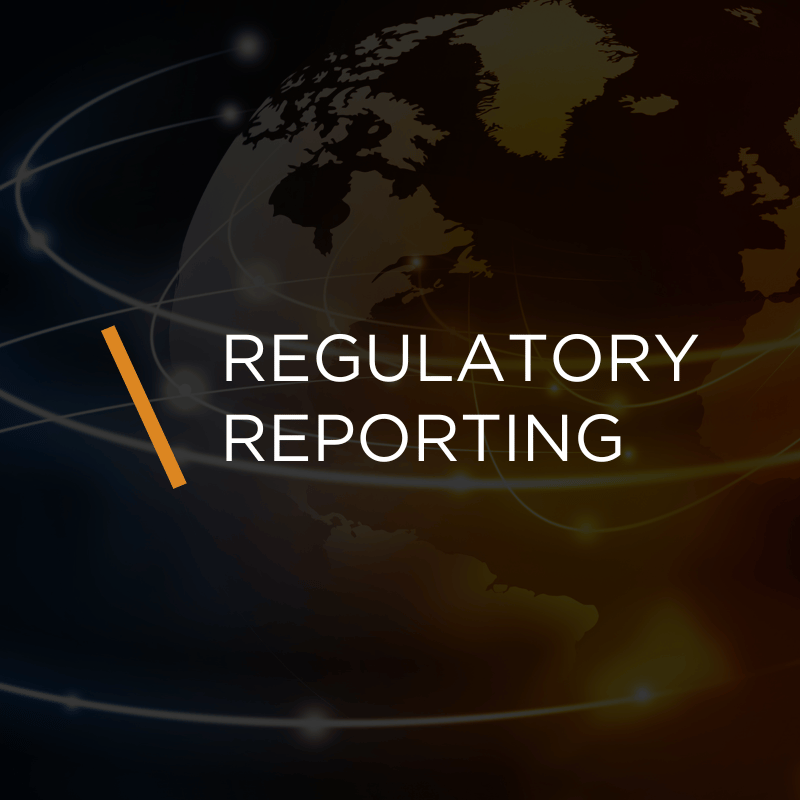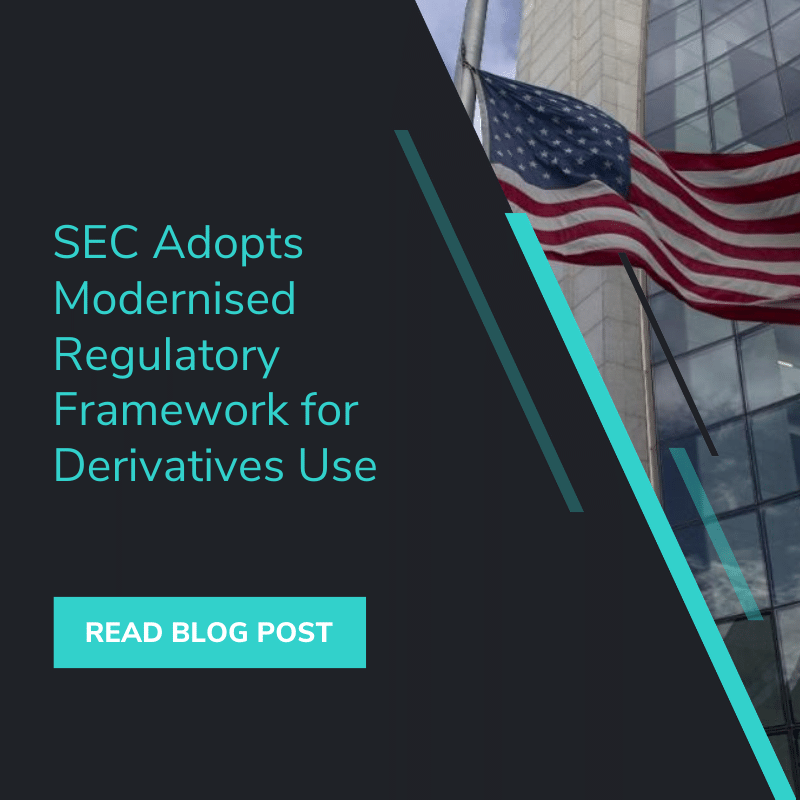Despite the continuing focus on the rapidly rising COVID-19 infections rates in the US & Europe, the looming Lockdown 2.0, and the impending, potentially contentious race for the White House, October saw regulators press ahead with the launch of several significant fund regulatory developments.
If you would like to see a full list of the developments tracked this month – click here.
Of note, last month saw:
- The SEC Adopt Rule 18f-4 Concerning Registered Funds’ Use of Derivatives
- The FCA issue its first fine for short selling notification failures
- The Central Bank of Ireland publish the outcome of a thematic review on CP86
- The EC publish a consultation on AIFMD II
See below this month’s regulatory round-up of some of the most interesting regulatory developments we tracked throughout October.
UNITED STATES
On 28th October, the Securities and Exchange Commission (SEC) voted to adopt new rules and form amendments, designed to provide an updated approach to the regulation of funds’ use of derivatives and certain other transactions.
New rule 18f-4, an exemptive rule under the Investment Company Act of 1940, permits mutual funds (other than money market funds), ETFs, registered closed-end funds, and business development companies to enter into derivatives transactions and certain other transactions notwithstanding the restrictions under section 18 of the Act.
The elements of the rule include:
- Derivatives Risk Management Program
- Limits on Fund Leverage Risk
- Exception for Limited Users of Derivatives
- Alternative Requirements for Certain Leveraged /Inverse Funds
- Reverse Repurchase Agreements and Unfunded Commitment Agreements
- Reporting
The new rule, and related rule and form amendments, will be published on the Commission’s website and in the Federal Register. All will be effective 60 days after publication in the Federal Register.
The rule then provides for an 18-month compliance transition period.
For more on this, see our blog:
The Commission is adopting a new rule and amendments under the Investment Company Act of 1940 designed to streamline and enhance the regulatory framework for funds that invest in other funds.
Rule 12d1-4 will permit a registered investment company or business development company to acquire the securities of any other registered investment company or BDC in excess of the limits in section 12(d)(1) of the Investment Company Act of 1940.
The rule’s conditions include the following:
Limits on Control and Voting
In terms of control, Rule 12d1-4 will prohibit an acquiring fund and its “advisory group” from controlling an acquired fund, except in certain limited circumstances. In terms of voting, the rule will require an acquiring fund and its advisory group to use mirror voting if:
- It holds more than 25% of an acquired open-end fund or unit investment trust (“UIT”) due to a decrease in the outstanding securities of the acquired fund or
- It holds more than 10% of a closed-end fund, with the ability to use pass-through voting when acquiring funds are the only shareholders of an acquired fund.
Required Evaluations and Findings before the acquiring fund invests in an acquired fund
The rule will require certain evaluations and findings be made before the acquiring fund invests in an acquired fund.
Required Fund of Funds Investment Agreements
The rule will require funds that do not share the same investment adviser to enter into a fund of funds investment agreement memorializing the terms of the arrangement. This and the evaluation and finding requirements replace a proposed requirement that would have prohibited an acquiring fund that acquires more than 3% of an acquired fund’s outstanding shares from redeeming more than 3% of the acquired fund’s total outstanding shares in any 30-day period.
Limits on Complex Structures
To limit funds’ ability to use fund of funds arrangements to create overly complex structures, rule 12d1-4 generally will prohibit funds from creating three-tier fund of funds structures, except in certain circumstances, including an exception that will permit an acquired fund to invest up to 10% of its total assets in other funds without restriction.
The CFTC has approved a final rule adopting amendments to Form CPO-PQR for commodity pool operators (CPOs).
The amendments to Form CPO-PQR include:
- Eliminating existing Schedules B and C of the form, except for the Pool Schedule of Investments;
- Amending the information requirements and instructions to request Legal Entity Identifiers (LEIs) for commodity pool operators and their operated pools that have them, and to delete questions regarding pool auditors and marketers; and
- Making certain other changes due to the rescission of Schedules B and C, including the elimination of all existing reporting thresholds.
UNITED KINGDOM
The FCA has added a new page regarding net short positions reporting and preparing for Brexit. If you’re a firm that reports net short positions, you can find the relevant page here.
Position holders will still be required to report their net short positions in shares at the standard 0.20% threshold.
The UK List of exempted shares will be published on FCA website from 1 January 2021.
Net short position notifications will continue to be sent through their Electronic Submission System.
Early in October, the FCA fined a Hong Kong hedge fund just over £870,000 for failing to disclose its net short position in Premier Oil Plc. This is the first time the FCA has taken enforcement action for a breach of the SSR.
Between February 2017 and July 2019, ARCM built a net short position equivalent to 16.85% of the issued share capital in Premier Oil, which is one of the largest short positions in UK history.
Asia Research and Capital Management Ltd (ARCM) agreed to resolve the matter and qualified for a 30% discount under the FCA’s executive settlement procedures. Were it not for this discount, the FCA would have imposed a financial penalty of £1,247,312.25 on ARCM.
EUROPE
The European Commission has launched a public consultation seeking the views of stakeholders on how to make the EU’s Alternative Investment Fund (AIF) market more efficient, effective and competitive, while maintaining the overall stability of the EU’s financial system.
The consultation is split into 7 sections with a total of 102 questions:
- Functioning of the AIFMD regulatory framework, scope and authorisation requirements
- Investor protection
- International relations
- Financial stability
- Investing in private companies
- Sustainability/ESG
- Miscellaneous
More on the consultation here:
The EU framework for screening of foreign direct investment (FDI) became fully operational on 11th October 2020. The FDI screening regulation adopted in March 2019 established an EU-wide framework in which the European Commission and the Member States can coordinate their actions on foreign investments. Following the formal entry into force of the FDI Screening Regulation in April 2019, the Commission and Member States have worked on putting in place the necessary operational requirements for the full application of the Regulation.
The new framework:
- Creates a cooperation mechanism where Member States and the Commission will be able to exchange information and raise concerns related to specific investments;
- Allows the Commission to issue opinions when an investment threatens the security or public order of more than one Member State, or when an investment could undermine a strategic project or programme of interest to the whole EU, such as Horizon 2020 or Galileo;
- Encourages international cooperation on investment screening, including sharing experience, best practices and information on issues of common concern;
- Sets certain requirements for Member States that wish to maintain or adopt a screening mechanism at national level. Member States also have the last word on whether or not a specific investment operation should be allowed in their territory, and;
- Takes into account the need to operate under short business-friendly deadlines and strong confidentiality requirements.
Towards the end of October, the Central Bank of Ireland (CBI) published the outcome of a thematic review of the implementation of its framework for governance, management and oversight in fund management companies (FMCs). The framework was introduced in 2017 for new firms and in 2018 for existing firms.
Some of the key issues identified in the review related to:
- Resourcing
- Designated Persons
- Delegate Oversight
- Risk Management Framework
- Board approval of new funds
- Organisational Effectiveness Director
- Gender Balance
For a detailed analysis of the review and conclusions, see our blog:
Finanstilsynet has modified the methodology to file the Annex IV AIFMD reporting.
The change will impact Q4 2020 reporting, which will require all AIFMs to submit the periodic AIFMD Annex IV reporting through Altinn.no. The previous reporting method through SFTP will no longer be available.
If you need assistance with AIFMD Annex IV reporting across the EU, please get it touch to learn how we help.
The Italian regulation (CONSOB) has once again extended the lower threshold until 13 January 2021. The lower thresholds apply to 104 companies listed in Italy, reducing the reporting thresholds from:
- 3% to 1% for “non-SMEs”; and
- 5% to 3% for SMEs
Request A Demo
Error: Contact form not found.

























